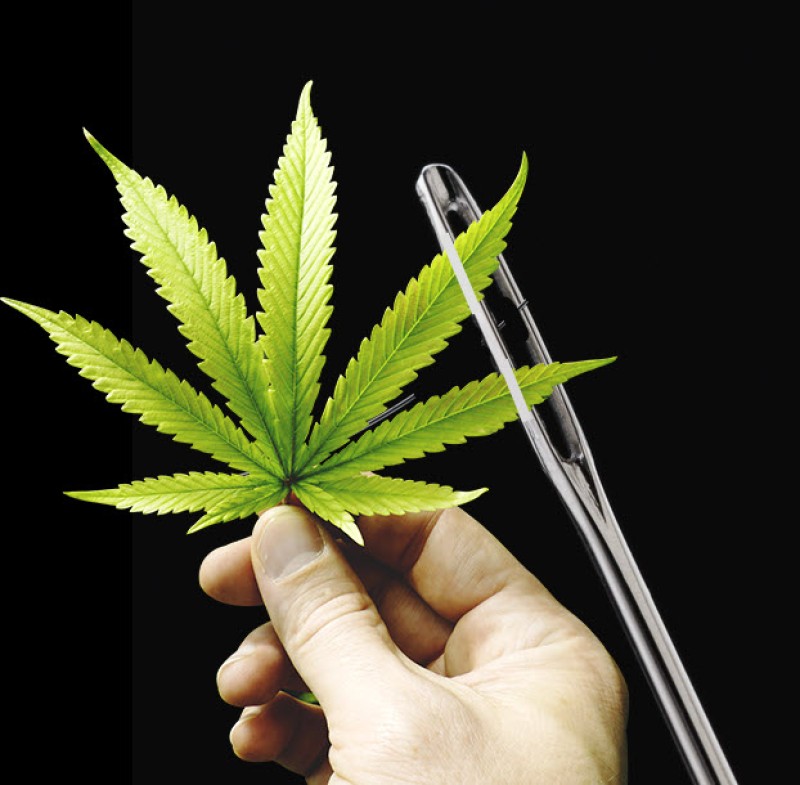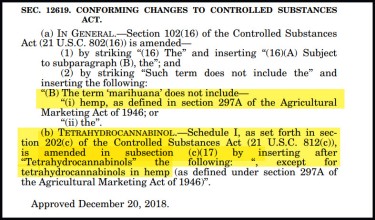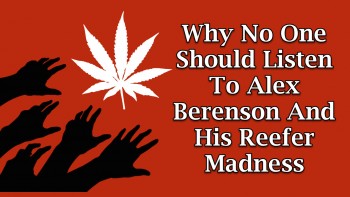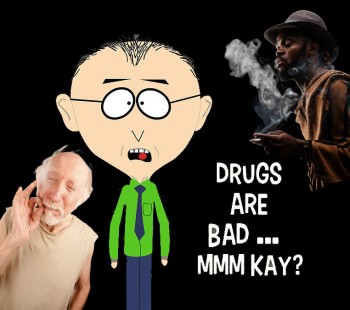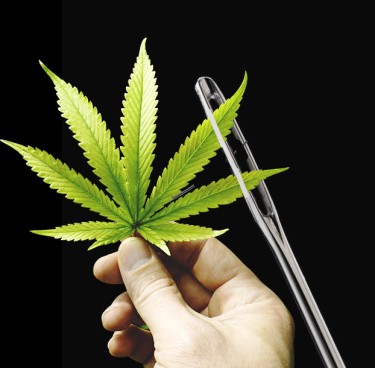
The Loophole That Exposed America's Cannabis Hypocrisy: Why Politicians Want to Re-Criminalize What People Actually Want
When a "loophole" accidentally creates a multi-billion dollar industry overnight, maybe it's time to admit it wasn't really a loophole—it was the will of the people finally finding expression despite decades of political obstruction. The 2018 Farm Bill's hemp legalization unleashed something politicians never saw coming: proof that Americans desperately want legal access to cannabis products, even if they have to get them through creative chemistry and regulatory gaps.
Now, predictably, those same politicians are scrambling to stuff the genie back in the bottle. Rep. Andy Harris (R-MD) recently shepherded through a House subcommittee a bill that would eliminate "any quantifiable amount of THC" from hemp products, effectively destroying an industry that employs hundreds of thousands of Americans and serves millions of consumers who can't access legal cannabis in their states.
The irony is delicious: politicians who claim to support free markets and limited government are rushing to re-criminalize products that sprouted from their own legislation, generated billions in economic activity, and provided legal alternatives to dangerous pharmaceuticals. They're about to hand a thriving legal industry back to drug cartels while claiming to protect public safety.
Here's what Rep. Harris and his prohibition-minded colleagues refuse to acknowledge: when consumers enthusiastically embrace products derived from a legal "loophole," that's not a regulatory failure—it's democracy in action. The hemp-derived THC industry didn't emerge because clever chemists fooled regulators; it emerged because prohibition has never reflected public demand for cannabis access.
As the Mexican cannabis market crashes—with wholesale prices dropping from hundreds of dollars per kilo to under $90—these politicians want to reverse course and re-empower the criminal organizations that American drug policy spent decades enriching. It's political malpractice disguised as child protection, and it's time for cannabis advocates to call it what it is: a direct assault on the people's will.
The "Loophole" That Revealed the Truth
The 2018 Farm Bill's hemp legalization seemed straightforward enough: allow cultivation and sale of cannabis plants containing less than 0.3% delta-9 THC by dry weight. Politicians thought they were legalizing rope and protein powder while keeping the "dangerous" intoxicating compounds safely prohibited. What they actually did was create the largest cannabis legalization experiment in American history.
Enterprising chemists quickly discovered that hemp plants contain other cannabinoids—delta-8 THC, THC-O, HHC, and dozens more—that weren't explicitly prohibited by the Farm Bill's language. More importantly, they developed processes to convert legal CBD into these alternative cannabinoids, creating a entirely legal pathway to psychoactive cannabis products.
The market response was explosive. Within five years, hemp-derived THC products generated an estimated $28 billion in annual sales across the United States. Gas stations, smoke shops, and dedicated retailers began selling everything from delta-8 gummies to high-potency THC beverages. Millions of Americans gained legal access to cannabis products for the first time in their lives.
But here's what prohibition apologists missed: this wasn't just about getting high. The hemp-derived market provided legal alternatives to expensive pharmaceuticals, offered consistent products with known potencies, and operated under existing business regulations with tax collection and employee protections. It proved that cannabis commerce could function safely within legal frameworks.
The "loophole" also exposed the arbitrary nature of cannabis prohibition. If delta-8 THC derived from hemp was legal while chemically identical delta-9 THC from marijuana remained federally prohibited, what scientific basis existed for this distinction? The answer, of course, is none—prohibition was always about politics and profits, not public health.
Most tellingly, the hemp market thrived in states with the strictest cannabis prohibition. Texas, with its harsh marijuana penalties, became one of the largest hemp-derived THC markets in the country. Alabama residents could legally purchase delta-8 products while facing arrest for traditional cannabis. The contradiction became impossible to ignore.
Rep. Harris now claims this situation represents "dangerous products" reaching consumers "under the false guise of being USDA approved." But the real danger he fears isn't to public health—it's to the prohibition regime that his political career depends on maintaining. The hemp market proved that cannabis commerce could operate safely, profitably, and legally, undermining every argument for continued criminalization.
The industry that emerged from this "loophole" employed hundreds of thousands of Americans, generated billions in tax revenue, and provided safer alternatives to black market products. If this constitutes a regulatory failure, it's the most successful failure in modern policy history.
Market Forces vs. Political Interference
The hemp-derived THC industry's rapid growth reveals something prohibition advocates desperately want to hide: Americans have always wanted legal access to cannabis, and they'll enthusiastically support any legal pathway to obtain it. Market forces don't lie—consumer demand drove this industry's explosive expansion despite regulatory uncertainty and constant political threats.
Consider the numbers: from virtually zero in 2018 to $28 billion annually by 2023, the hemp-derived market represents one of the fastest-growing industries in American history. This wasn't driven by deceptive marketing or corporate manipulation—it was organic consumer demand finally finding legal expression.
Meanwhile, the illegal cannabis market has been collapsing in states with hemp access. Mexican cartels, who once dominated American cannabis distribution, have seen wholesale prices plummet from hundreds of dollars per kilogram to under $90. The DEA's own intelligence reports acknowledge that legal cannabis markets have devastated cartel revenue streams.
This market disruption represents exactly what drug policy reformers have predicted for decades: legal alternatives eliminate illegal markets more effectively than any enforcement strategy. When consumers can purchase tested, labeled products from legitimate businesses, they abandon dangerous black market alternatives.
But Rep. Harris and his allies want to reverse this progress. Their proposed legislation would eliminate virtually all hemp-derived THC products, forcing millions of consumers back to illegal sources or expensive pharmaceuticals. This isn't protecting public health—it's protecting criminal organizations and pharmaceutical profits at consumers' expense.
The Wine & Spirits Wholesalers of America, in a rare moment of policy clarity, called Harris's approach "troublesome" and "overly broad," noting it would "undermine states across the country who have enacted critical regulations." Even alcohol industry lobbyists recognize that prohibition doesn't work and regulation is superior.
Aaron Smith, CEO of the National Cannabis Industry Association, captured the absurdity perfectly: "Despite legislators' intent, this budget provision won't change that fact [that hemp-derived THC products are widely available], but it will ensure these products are made and sold without oversight, delivering a big win to the drug cartels at the expense of public health and safety."
The hemp industry has already proven that cannabis commerce can operate within legal frameworks. Businesses pay taxes, employ workers, follow safety regulations, and serve adult consumers responsibly. Harris wants to criminalize this success while pretending it will somehow improve public safety.
Market forces consistently demonstrate that prohibition fails while regulation succeeds. The hemp industry's growth proves Americans want legal cannabis access. Politicians who ignore this reality aren't protecting anyone—they're prolonging a failed policy that enriches criminals while punishing law-abiding citizens.
The Cartel Comeback: How Prohibition Enriches Criminals
Rep. Harris's hemp ban represents the single largest gift to drug cartels since the original Marijuana Tax Act of 1937. By eliminating legal alternatives, politicians are about to hand a multi-billion dollar market back to criminal organizations while claiming to protect public safety. The hypocrisy is breathtaking.
Mexican cartels dominated the American cannabis market for decades, generating billions in untaxed revenue that funded violence, corruption, and territorial expansion. The emergence of legal cannabis markets has devastated this revenue stream. DEA intelligence reports document dramatic price collapses in illegal cannabis as legal alternatives capture market share.
But cartels adapt quickly to policy changes. When legal hemp-derived products disappear from retail shelves, illegal alternatives will immediately fill the void. Consumers won't simply stop using cannabis products—they'll return to unregulated sources that don't check IDs, pay taxes, or follow safety standards.
The timing couldn't be worse for public safety. Chinese synthetic drug operations have increasingly moved into cannabinoid production, manufacturing dangerous compounds like K2 and synthetic THC analogs. Harris's ban will create massive demand for these unregulated alternatives as consumers lose access to safer hemp-derived products.
Street dealers don't card customers or limit sales to adults. They don't test products for contaminants or provide accurate labeling. They don't follow advertising restrictions or avoid targeting children. Yet Harris's legislation will force millions of consumers back to these dangerous sources while claiming to protect youth.
The enforcement costs alone should horrify fiscal conservatives. Rather than collecting taxes from legitimate businesses, law enforcement will spend millions arresting and prosecuting hemp product distributors. Courts will clog with non-violent cannabis cases while violent criminals receive less attention.
International cartels are already preparing for America's policy reversal. Intelligence reports indicate that Mexican and Chinese organizations are ramping up synthetic cannabinoid production in anticipation of renewed prohibition. Harris's legislation won't eliminate demand—it will ensure that criminals capture 100% of the market share.
State-level taxation and regulation have generated hundreds of millions in revenue while reducing illegal market activity. Harris wants to eliminate this success and return to the failed prohibition model that enriched criminals for decades. This isn't policy reform—it's policy regression that benefits only those who profit from illegal markets.
The hemp industry's collapse won't happen gradually. Once federal prohibition returns, legitimate businesses will immediately cease operations while criminal organizations flood the market with dangerous alternatives. Consumers will lose access to tested, regulated products while cartels celebrate their windfall.
Harris claims to oppose "dangerous products reaching consumers," but his legislation guarantees that the most dangerous products will dominate the market. Regulated hemp businesses ensure product safety; criminal cartels prioritize profit over consumer welfare.
The Democratic Deficit: When Politicians Ignore the People
The most damning aspect of Harris's hemp prohibition isn't its policy failure—it's its complete dismissal of democratic will. Polling consistently shows that 70% of Americans support cannabis legalization, yet politicians continue pursuing policies that contradict public preferences while claiming to represent their constituents.
The hemp industry's success represents democracy in action. When legal pathways emerged, millions of Americans enthusiastically embraced cannabis products despite decades of prohibition propaganda. This wasn't manipulation or deception—it was consumer choice finally finding expression through legal channels.
State-level responses to hemp products have varied, but even in conservative states, voters consistently support regulated access over outright prohibition. Texas, Alabama, and other traditionally prohibition-friendly states saw hemp markets flourish because residents wanted legal alternatives to black market products.
Harris's legislation ignores this demonstrated preference in favor of ideology and special interest pressure. The Wine & Spirits Wholesalers' opposition to his approach reveals that even alcohol industry lobbyists recognize prohibition's futility. When your policy position is too extreme for alcohol distributors, perhaps it's time to reconsider.
The democratic deficit extends beyond cannabis policy to broader questions about representative government. If elected officials consistently pursue policies that contradict constituent preferences, what does representation actually mean? Harris represents Maryland, where 70% of voters support cannabis legalization, yet he leads efforts to re-criminalize cannabis products.
This disconnect between public opinion and policy implementation has corrupted American drug policy for decades. Politicians pursue prohibition because pharmaceutical companies, law enforcement unions, and prison contractors provide campaign funding, not because voters demand continued criminalization.
The hemp industry proved that cannabis regulation works better than prohibition. Businesses operated transparently, paid taxes, and served adult consumers responsibly. Politicians want to criminalize this success while offering no evidence that prohibition provides superior outcomes.
Cannabis advocates need to challenge this democratic deficit directly. Voters who support legalization should demand that their representatives implement policies reflecting their preferences, not the preferences of special interest groups. Politicians who ignore constituent will should face electoral consequences.
The 2024 elections provide opportunities to address this representation gap. Cannabis legalization enjoys majority support in virtually every congressional district, yet many representatives continue supporting prohibition. Primary challenges and general election opposition should target politicians who refuse to implement popular policies.
New leadership could emerge from the cannabis advocacy community itself. Candidates with direct experience in legal cannabis markets understand policy nuances better than career politicians who've never seriously examined prohibition's failures. The expertise exists—it just needs electoral expression.
The Sticky Bottom Line
Rep. Harris's hemp prohibition represents everything wrong with American drug policy: politicians ignoring public preferences, protecting special interests over constituent welfare, and doubling down on failed prohibition policies despite overwhelming evidence of their futility. This isn't governance—it's ideological obstruction masquerading as public protection.
The hemp industry's emergence from a regulatory "loophole" exposed the fundamental truth about cannabis prohibition: it never reflected public demand or scientific evidence, only political convenience and corporate protection. When Americans gained legal access to cannabis products, they embraced them enthusiastically, proving that prohibition was always about control rather than safety.
Now politicians want to re-criminalize this success and hand billions in revenue back to drug cartels while claiming to protect public health. The absurdity is staggering: they'll eliminate regulated businesses that check IDs and pay taxes to empower criminal organizations that do neither.
The hemp ban won't eliminate cannabis products—it will ensure that only criminals provide them. Mexican cartels and Chinese synthetic drug operations are already preparing for prohibition's return, ready to capture market share that currently supports American businesses and workers.
This policy reversal comes despite overwhelming public support for cannabis legalization and demonstrated success of regulated markets. The democratic deficit couldn't be clearer: politicians are implementing policies that contradict constituent preferences to serve special interests that fund their campaigns.
Cannabis advocates must recognize that incremental reform isn't sufficient when politicians actively seek to reverse progress. The hemp industry proved that full legalization works better than half-measures, generating economic benefits while reducing criminal market activity. Yet politicians want to criminalize this success rather than expand it.
The 2026 elections provide opportunities to address this representation gap. Voters who support cannabis legalization should demand candidates who will implement popular policies rather than protecting pharmaceutical profits and prohibition bureaucracies. Politicians who ignore constituent will should face primary challenges and general election opposition.
New leadership could emerge from within the cannabis community itself. Industry professionals, medical patients, and reform advocates understand policy nuances better than career politicians who've built careers on prohibition enforcement. The expertise exists—it just needs electoral expression.
The hemp prohibition vote reveals which politicians serve special interests over public welfare. Voters should remember these names and act accordingly when election time arrives. Democracy only works when representatives actually represent their constituents rather than their campaign contributors.
The "loophole" that created the hemp industry wasn't a regulatory accident—it was democracy finally finding expression despite political obstruction. Now politicians want to close that democratic opening and return to failed prohibition policies that benefit only criminals and corporations.
Cannabis advocates shouldn't just oppose this specific legislation—they should use it as motivation to completely transform American drug policy. Half-measures and incremental reforms haven't worked. It's time to elect representatives who will implement the full legalization that Americans actually want.
The shitfuckery, as you so eloquently put it, can only be undone by replacing the politicians who created it. The hemp industry proved what's possible when legal frameworks replace prohibition. Now it's time to prove what's possible when democratic will replaces corporate capture.
The people have spoken through market choices and polling data. Politicians who refuse to listen should find themselves seeking new employment. Democracy demands nothing less than representatives who actually represent the people they claim to serve.
THE HEMP CANNABIS LOOPHOLE TO GET HIGH, READ ON...
UNDER 0.3% THC BY NET WEIGHT, THE LOOPHOLE THAT STARTED IT ALL!
